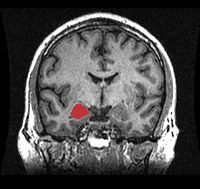
Hormone May Explain Cognitive Decline in Adults Who Experienced Childhood Abuse
February 14, 2019
Many people who experienced abuse as children also experience cognitive decline as adults. A new study has shown that the hormone interleukin-6 (IL-6) is commonly found in very high levels in these individuals. IL-6, which is involved in processes of swelling and inflammation, can be controlled with medication. Understanding the role of IL-6 may be an important new step to improve the lives of people who experience childhood abuse. For more information about this study, please visit the NIH website.

New Study Indicates Link Between Gut Bacteria and Depression
February 4, 2019
In a new study of the human microbiome, the complex ecosystem of microorganisms that exists inside a person’s body, researchers have found links between specific bacteria and depression. People with treatment-resistant depression had microbiomes that were less likely to contain serotonin- and dopamine-creating bacteria. Although more investigation is needed, this is a fascinating direction for future research. For more information on this study, please see this article in Forbes.

Brain Biomarkers, Structural Differences May Predict Severity of PTSD
January 30, 2019
A new study examining the brain structure and activity of combat veterans with PTSD may help explain why some people experience symptoms of PTSD much more severely than others. Certain areas of the brain involved in learning and emotional response, most noticeably the amygdala, were meaningfully different in veterans with more severe symptoms. For more information about this study, please visit the NIH website.

All of Us Research Program Introduces Fitbit Compatibility
January 16, 2019
The NIH’s monumental All of Us Research Program has launched a new way for participants to contribute data with the Bring-Your-Own-Device (BYOD) project. In addition to sharing information through surveys, electronic health records, and biological samples, participants with any Fitbit device can now choose to share data such as physical activity, sleep, weight, heart rate, nutrition, and water intake. For more about the BYOD project and All of Us, please visit the NIH website.

